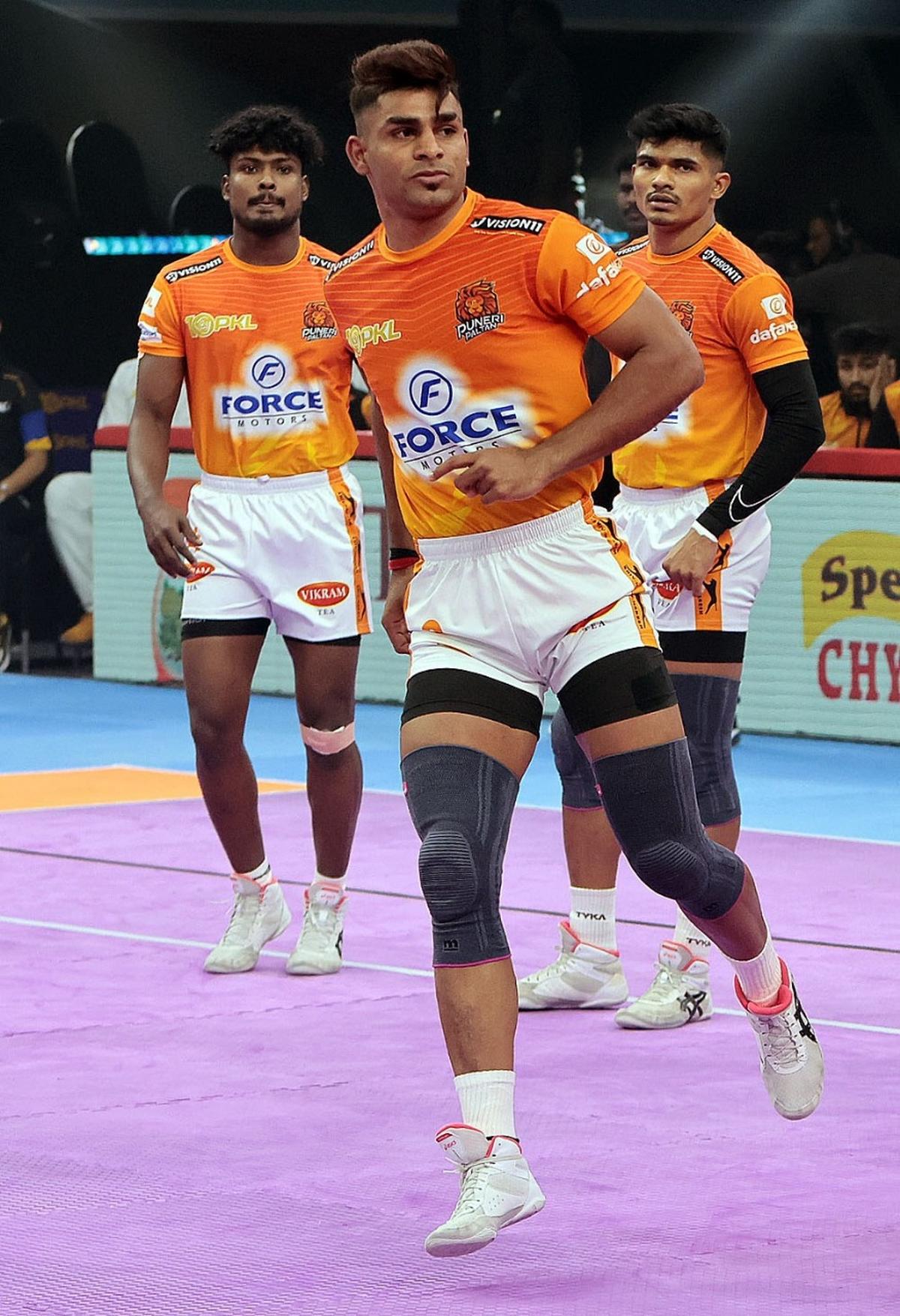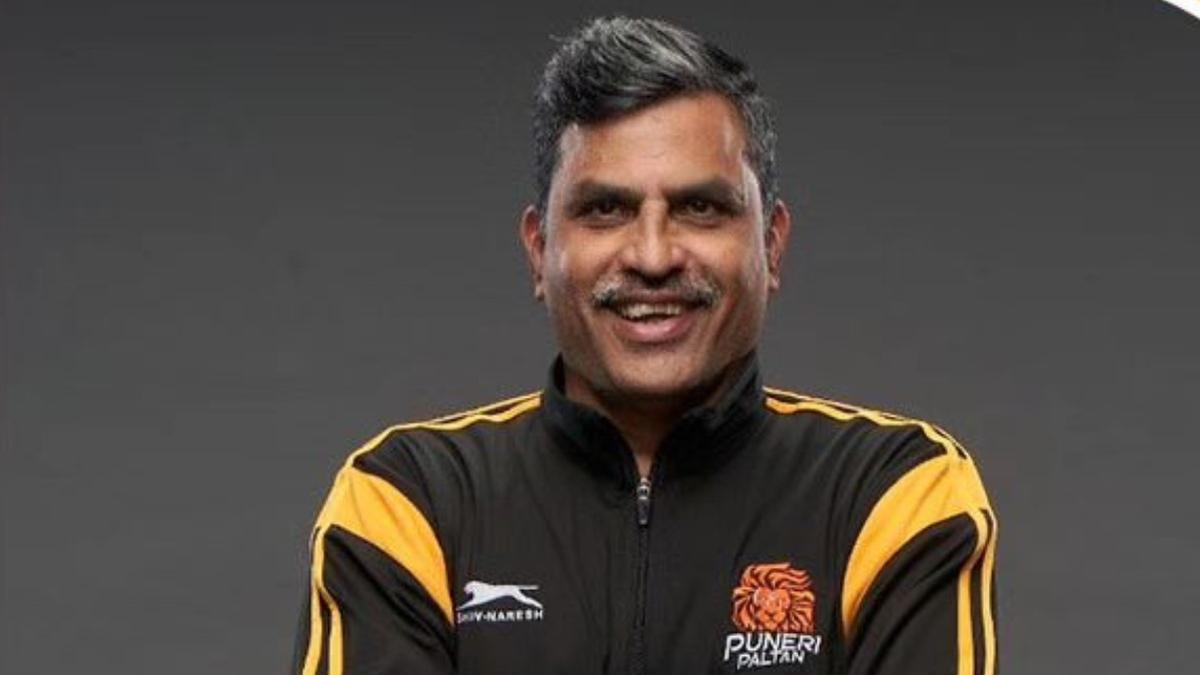Ashok Shinde: The architect of Puneri Paltan’s Pro Kabaddi revolution
Puneri Paltan’s maiden title conquest in Pro Kabaddi League (PKL) season 10 is testament to the value of academy systems in a franchise-based league for a sport as traditionally rooted as kabaddi.
Puneri didn’t just win PKL 10; it obliterated the competition. With a dominance hitherto unseen, it clinched the title, amassing more points and victories than any team in history, while also boasting the league’s most impenetrable defence.
It was orchestrated by a homegrown core, with six of the starting seven hailing from its Yuva Paltan academy. It was the triumph of the process that has been nurturing talent season after season, regardless of the outcome.
Following its historic victory on March 1, 2023, Puneri coach B.C. Ramesh credited the team’s success to its commitment to youth development. He specifically acknowledged the contributions of the team’s mentor, Ashok Shinde, for cultivating young players at Yuva Paltan.
In the competitive world of franchise sports leagues, talented academy players are worth their weight in gold. The PKL is no exception, where the top players can go under the hammer every year during the auction. This is where Yuva Paltan comes into the picture. It is the feeder team to the Puneri and its academy, which serves as a launchpad for promising talent.
Shinde, an Arjuna awardee, is one of the most well-known personalities in the Indian kabaddi circuit who pioneered and implemented the academy system for the Pune-based team.
ALSO READ | Telugu Titans aims to break cycle of underperformance in PKL 11, coach Hooda stresses on maintaining balance
“During one meeting, to discuss auction strategy ahead of season five, our owner Jay Kotak was worried about the limited pool of top talents. At that meeting, I floated the idea of creating an academy to utilise the NYP (New Young Player) rule,” Shinde tells Sportstar.
The two-time Asian Games Gold medallist, who has coached the Air India Kabaddi team for over a decade, wanted to use his expertise in developing youngsters to create a sustainable team and negate the impact of the auction.
“For Air India, I used to scout players from local tournaments and then trained them before integrating them into the first team. I wanted to do the same in PKL to reduce the dependency on auctions,” explains Shinde.
Paltan’s conquest was not merely a show of superiority, but on its way to the summit it had also revolutionised the way kabaddi was played. With an ultra-aggressive style of play, it decimated the line between attackers and defenders.
“I read about the concept of total football and wanted to implement that in kabaddi. I intended to create a system in which a team should never be without seven players on the mat for too long. If a raider is out, another raider can revive or defenders can do it. I want my players to be actively seeking points,” describes Shinde, who also coached Japan during the 2016 Kabaddi World Cup.
Yuva Paltan began in 2017 as a residential programme where players stayed together and competed in over 15 local tournaments throughout the year. This transitioned into their impeccable chemistry on the mats of PKL.
“The players all lived together for two years. Apart from Shadloui (Mohammadreza Chiyaneh Shadloui), almost all of our squad has been trained by Ashok at Yuva Paltan. This is reflective of our kabaddi style,” Puneri coach Ramesh told Sportstar.
While player scouting is methodical, discovering exceptional talent often requires relentless effort and experimentation.
“While scouting we only look for skills in players. For example, if we’re looking at a defender, we’re observing how he applies back holds, ankle holds or how he gets involved in a chain tackle. If he has a minimum of three skills then we can develop the player further. Skills are the most important thing, fitness is secondary because we can work on his fitness but skills are intuitive,” he explains. “We pick raw talents from various tournaments mostly from rural areas. We don’t take players in the NYP category in their first year. We train them for a whole year and if we believe they are ready then only we draft them as NYPs in the second season.”
As the coach of Air India, Shinde has shaped dozens of players, who went on to become represent India at the highest level. With Yuva Paltan, he’s doing the same. Players like Aslam Inamdar, Gaurav Khatri, Mohit Goyat, and Pankaj Mohite, to name a few are knocking on the door of the National team’s starting seven if not already playing.
Aslam, the heartbeat and the skipper of Puneri, who was awarded the Most Valuable Player (MVP) trophy last season has the utmost regard for Shinde.
“Ashok sir is like a father figure to me. He supported me when no one else did, he believed in me when no one else did. It is because of him and my family I’ve reached his stage. Ashok sir is a strict teacher and a loving person,” Aslam told Sportstar.

(From L-R) Abhinesh Nadarajan, Aslam Inamdar and Pankaj Mohite.
| Photo Credit:
SPECIAL ARRANGEMENT
(From L-R) Abhinesh Nadarajan, Aslam Inamdar and Pankaj Mohite.
| Photo Credit:
SPECIAL ARRANGEMENT
An ardent fan of former Manchester United manager Sir Alex Ferguson, Shinde stresses educating young players about the sport, teaching them discipline and helping them understand how to protect themselves on the mat.
“In a contact sport like kabaddi, it is necessary to take time with raw talents. We need to train them properly and educate them about how to take care of their bodies otherwise career-threatening injuries can happen just like that. There is no shortcut to PKL,” he opines.
The title win had a profound impact on the veteran coach as he saw his years of hard work culminating into something tangible. “I had tears in my eyes, it was the third time I had tears in my eyes for kabaddi. The first two times were during the Asian Games presentation ceremony,” says Shinde.
“When I floated the idea to our owner, I clearly told him that it would take at least three yeast before we could bear its fruits. I will continue my job of providing Puneri Paltan with talented young players.”
ALSO READ | PKL Auction 2024: Five New Young Players who went on to shine in Pro Kabaddi League
Puneri has retained a strong core of eight players from their title-winning squad, giving them a significant edge heading into the Season 11 auction. However, the defending champions face a strategic challenge due to the PKL’s retention rules in the future.
The team won’t be able to hold onto all these players further, as players can only be retained in the New Young Players category for one season before transitioning to the Elite Player category. Furthermore, teams are limited to retaining only three Elite Players.
Despite this possibility, Shinde’s quest to identify and nurture young talent continues unabated. Just over two months after clinching the title, he started a training camp to ensure a steady stream of talent for the first team. The commitment to youth development is evident with four Yuva Paltan graduates set to feature in the team’s PKL 11 campaign as it aims to defend its championship.



